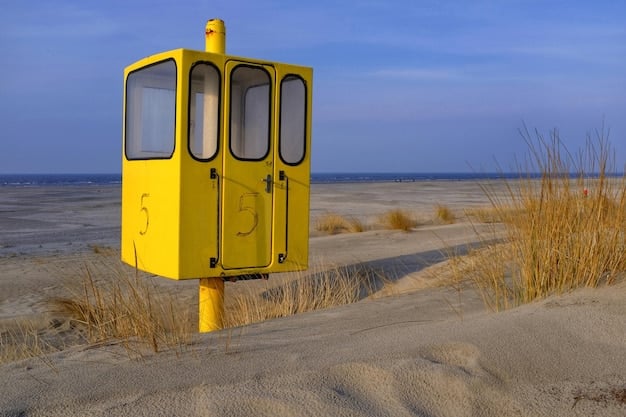Maximize Your Beach Trip: 7 Money-Saving Hacks for US Travelers

Achieve an affordable and memorable beach vacation by strategically implementing smart budgeting techniques, from early planning and off-season travel to leveraging self-catering options and optimizing transportation costs, ensuring a rewarding experience without overspending.
Embarking on a beach getaway often conjures images of pristine sands and azure waters, but the perceived high costs can sometimes keep those dreams at bay. However, for US travelers, there are numerous savvy strategies to <maximize your beach trip: 7 money-saving hacks for US travelers> without compromising on the experience.
Mastering the Art of Off-Peak Travel
One of the most impactful ways to significantly reduce the cost of a beach vacation is to strategically plan your trip during the off-peak or shoulder seasons. This approach often presents a duality of benefits: not only are prices for accommodations and flights considerably lower, but the beaches themselves tend to be less crowded, offering a more serene and authentic experience. The concept of off-peak travel extends beyond traditional holiday periods, embracing the nuances of regional weather and school calendars.
Understanding Seasonal Variations
Beach destinations in the US, from the bustling coasts of Florida to the serene shores of the Pacific Northwest, experience distinct seasonal fluctuations in demand. Peak season typically aligns with summer holidays, spring break, and major national events. By identifying and avoiding these high-demand periods, travelers can unlock substantial savings. For instance, visiting a Florida beach in late September or early October can provide pleasant weather with a fraction of the summer crowds and prices. Similarly, exploring the Outer Banks in May or early June, or after Labor Day, offers a beautiful environment often coupled with more attractive rates.
- September through November: Post-summer rush in many southern states, fewer families due to school.
- Late April to early June: Pre-summer season, typically pleasant weather before peak heat and humidity set in.
- Weekdays vs. Weekends: Even within peak seasons, weekday stays are almost always more affordable than weekend getaways.
The shoulder season, bridging the gap between peak and off-peak, often provides the best of both worlds: good weather and reasonable prices. This period requires a bit of research into the specific region’s climate patterns and event schedules, but the payoff in savings and enjoyment can be immense. Flexibility with travel dates is a powerful tool in leveraging these seasonal dynamics. Even shifting your departure or return by a day or two can sometimes lead to surprising price differences, particularly for flights and direct bookings with hotels.
Benefits Beyond Cost Savings
Beyond the immediate financial advantages, off-peak travel enriches the overall beach experience. Less crowded beaches mean more space to relax, play, and explore without feeling overwhelmed by throngs of tourists. Local restaurants and attractions often have shorter wait times, and the ability to engage with the local culture feels more authentic when the tourist infrastructure isn’t stretched to its limits. This provides an opportunity for a more intimate connection with the destination, allowing for unhurried exploration and genuine relaxation. It shifts the focus from merely “seeing” a place to truly “experiencing” it, fostering memories that are often more profound due to the absence of peak season pressures.
Furthermore, local businesses may offer special deals or discounts during slower periods to attract visitors, adding another layer of potential savings. From off-season rental car rates to discounted excursions, these perks can further enhance the value of your trip. Consider exploring local festivals or events that might occur during these quieter times; they often provide a unique cultural insight that is less accessible during the busiest periods. The tranquility and ease of movement during off-peak windows transform a simple beach trip into a more profound and enjoyable retreat, proving that less crowded often means more rewarding.
Strategic Accommodation Choices: Beyond Traditional Hotels
When planning a beach trip, accommodation often represents one of the largest expenses. Moving beyond conventional hotel bookings opens up a world of cost-saving possibilities, offering not only affordability but also unique experiences. From vacation rentals to camping, diversifying your lodging options can significantly reduce your overall trip cost while catering to different travel styles and preferences. The key lies in understanding the distinct advantages each alternative offers and how they align with your travel goals.
Embracing Vacation Rentals and Condos
For families or groups, vacation rentals through platforms like Airbnb, Vrbo, or local rental agencies can be a game-changer. These options frequently provide more space, privacy, and crucial amenities such as fully equipped kitchens, which ties into another major money-saving hack. The ability to prepare your own meals can drastically cut down on dining expenses, which quickly accumulate during a typical vacation. Beyond the kitchen, rentals often come with laundry facilities, allowing you to pack lighter and avoid costly hotel laundry services.
- Cost-effectiveness for Groups: Dividing the cost among several people makes high-quality rentals surprisingly affordable per person.
- Home-away-from-home Comforts: Enjoy larger living areas, multiple bedrooms, and often outdoor spaces like patios or decks.
- Access to Local Markets: Proximity to grocery stores enables fresh, budget-friendly meal preparation.
Exploring lesser-known areas slightly removed from the main tourist hubs can also yield more affordable rental options without sacrificing beach access. Many coastal towns have charming neighborhoods a short walk or quick drive from the sand that offer better value. Always read reviews meticulously and thoroughly check booking policies regarding deposits and cancellations. Booking directly with property owners or local management companies can sometimes avoid platform fees, offering additional savings and a more personal booking experience.
Alternative Lodging: Camping and Hostels
For the truly budget-conscious or adventurous traveler, camping near a beach offers an unparalleled connection with nature at a fraction of the cost. Many state and national parks along the US coast offer campsites, often with basic amenities like restrooms and showers. These sites sell out quickly, especially during peak seasons, so advance reservations are crucial. Camping provides an immersive experience, allowing guests to fall asleep to the sound of waves and wake up to stunning sunrises over the ocean, reinforcing a sense of connection with the natural environment that luxury hotels often cannot replicate.
Hostels, while less common directly on the beach, can be found in coastal cities and offer dormitory-style accommodations ideal for solo travelers or small groups on a shoestring budget. Many hostels provide private rooms as well, often at prices lower than traditional hotels. They are also excellent places to meet fellow travelers and find budget-friendly local tips. While amenities might be basic, the social atmosphere and affordability make them a viable alternative. Always ensure the hostel’s location is convenient for beach access, whether by public transport or a short walk.

Embrace Self-Catering and Picnic Power
Dining out, especially in popular beach destinations, can quickly deplete your vacation budget. Adopting a self-catering approach and embracing the power of picnics can lead to substantial savings, allowing you to reallocate those funds to experiences or simply enjoy a more extended stay. This strategy goes beyond just saving money; it offers flexibility, the chance to enjoy healthier meals, and the unique pleasure of dining al fresco with ocean views, turning mealtime into part of the adventure rather than just a necessity.
Grocery Store Savvy
Before hitting the beach, a strategic stop at a local grocery store is paramount. Stocking up on breakfast items, sandwich supplies, snacks, and drinks can dramatically cut down on daily food expenses. Many vacation rentals come with fully equipped kitchens, transforming meal preparation from a chore into an enjoyable part of the trip. Consider planning simple meals that require minimal cooking, such as pasta dishes, salads, or grilled items if your accommodation offers barbecue facilities. This not only saves money but also time, allowing more moments to be spent on the sand or in the water. Look for local specials or bulk discounts, especially if traveling with a group.
- Breakfast Bargains: Cereal, yogurt, eggs, and fruit are far cheaper than daily restaurant breakfasts.
- Lunch Simplicity: Pack sandwiches, wraps, and salads for easy, portable beach meals.
- Snack Stash: Bring along granola bars, trail mix, and fresh fruit to avoid overpriced concession stand impulse buys.
Exploring local farmers’ markets can provide fresh, seasonal produce at competitive prices, offering a taste of the region’s culinary delights. It’s also an excellent way to support local businesses and often discover unique ingredients you wouldn’t find in a standard supermarket. The experience of shopping at a vibrant market can be an adventure in itself, adding a cultural layer to your beach vacation. Always remember to consider perishable items, ensuring you have proper storage like a cooler or insulated bag, especially on hot beach days.
The Art of the Perfect Picnic
Picnics are the quintessential beach meal. They are not only budget-friendly but also offer the unbeatable ambiance of dining with a view. Instead of paying for an expensive beachfront restaurant, pack a cooler with your homemade delights, a blanket, and enjoy your meal right on the sand. This offers unparalleled flexibility; you can choose your dining time and location, avoiding crowded eateries and enjoying the natural surroundings fully. Picnics are also ideal for families with young children, providing a relaxed and informal dining experience without the constraints of a restaurant setting.
Think beyond just sandwiches: cold salads, pasta salads, pre-cut fruits and vegetables, and even homemade baked goods can elevate your beach picnic. Don’t forget essentials like napkins, wet wipes, and a trash bag to leave no trace. Hydration is key, so bring plenty of water and perhaps some reusable bottles to refill. By making picnics a regular part of your beach routine, you’ll not only save a significant amount of money but also create lasting memories of simple, joyful meals by the ocean, transforming a necessary expense into a cherished experience.

Smart Transportation: Drive, Carpool, or Public Transit
Transportation costs can be a sneaky budget buster on any trip, and beach vacations are no exception. Opting for a strategic approach to getting to and around your destination can yield significant savings, allowing more of your budget to be allocated towards experiences. Whether it’s the journey itself or local excursions, thoughtful transportation choices are paramount to a cost-effective beach getaway. The decision between driving, carpooling, or leveraging public transit depends heavily on your origin, destination, and the nature of your trip.
Driving and Carpooling Advantages
For many US travelers, driving to a beach destination is often the most economical option, especially for groups or families. It eliminates airfare costs, allows for unlimited luggage without fees, and provides the flexibility to explore different beaches or attractions at your own pace. Before setting out, calculate fuel costs and compare them against potential flight and rental car expenses. Planning your route to avoid tolls where possible, or optimizing for fuel-efficient routes, can further enhance savings. Using navigation apps that offer real-time traffic updates can help avoid costly delays and unnecessary fuel consumption.
- Cost-Sharing: Carpooling with friends or family significantly reduces per-person fuel and toll expenses.
- Flexibility: The freedom to stop at roadside attractions, grocery stores, or overlooked scenic spots.
- Luggage Freedom: No baggage fees or restrictions on beach gear like umbrellas, coolers, and chairs.
If you’re flying to a region, consider renting a car only for a portion of your trip, or explore ride-sharing options for specific excursions. Carpooling apps or coordinating with fellow travelers (if safe and appropriate) for local transportation can also split costs. Always compare rental car prices from various agencies and consider booking well in advance, especially during peak seasons, as last-minute rentals tend to be more expensive. Ensure you understand the insurance options and any additional fees before finalizing your rental agreement.
Leveraging Public Transportation and Walking
In many popular beach towns and coastal cities, public transportation can be a surprisingly efficient and cost-effective way to get around. Buses, trolleys, or even beach shuttle services often connect accommodations to main attractions, dining areas, and beach access points. Research the local public transit system before your arrival to understand routes, schedules, and fare options. Purchasing multi-day passes, if available, can offer even greater savings compared to individual fares. This method not only saves money on gas and parking but also reduces the stress of navigating unfamiliar roads and finding parking, which can be particularly challenging and expensive in prime beach locations.
Walking and biking are perhaps the ultimate budget-friendly transportation methods. If your accommodation is within walking or biking distance of the beach and other amenities, this approach saves money and offers health benefits. Many beach towns are increasingly bike-friendly, with dedicated paths and rental shops. Exploring on foot allows you to discover hidden gems that you might miss while driving, fostering a deeper connection with the local environment. Before relying on walking or biking, assess the distances, terrain, and safety of the routes. Embracing these sustainable and economical transportation choices contributes to a more relaxing and financially sensible beach trip.
Uncover Free and Low-Cost Beach Activities
A beach vacation doesn’t need a lavish budget for entertainment. Many of the most memorable and enjoyable experiences along the coast are either free or come with a very low cost, requiring only a sense of adventure and an appreciation for nature. Focusing on these naturally occurring wonders and community offerings allows travelers to immerse themselves in the destination’s beauty and culture without overspending on costly attractions or organized tours. The key is to shift perspective from paid entertainment to the inherent joy found in simpler pleasures and natural exploration.
Embrace Nature’s Playground
The beach itself is a boundless playground offering a myriad of free activities. Swimming, sunbathing, and building sandcastles are timeless classic activities that cost nothing but provide hours of enjoyment for all ages. Long walks along the shoreline, collecting seashells, or searching for unique driftwood pieces connect you with the natural environment. These unhurried moments often become the most cherished memories, offering an opportunity for introspection or quality time with loved ones away from commercial distractions. Consider a digital detox to fully appreciate the sounds of the waves and the feeling of sand between your toes.
- Body Surfing/Boogey Boarding: Utilize the natural waves for exhilarating, free water fun.
- Beachcombing: Discover unique shells, sea glass, and other treasures washed ashore.
- Sunset/Sunrise Watching: Experience breathtaking natural spectacles for free.
Exploring tide pools at low tide reveals fascinating marine life, offering a free educational experience for curious minds. Many coastal areas feature public parks or nature preserves adjacent to beaches, providing opportunities for hiking, birdwatching, or picnicking with scenic views. These areas often have well-maintained trails and observation decks, allowing for a deeper appreciation of the local ecosystem. Packing your own frisbee, volleyball, or simple beach games can provide endless entertainment without any additional cost, reinforcing the idea that fun doesn’t need to be expensive.
Seek Out Free Local Events and Attractions
Many beach towns host free events, especially during shoulder seasons, as a way to attract visitors. Check local community calendars or tourism websites for free concerts in the park, outdoor movie nights, farmers’ markets, art walks, or street festivals. These events offer a glimpse into the local culture and provide entertainment without an admission fee. Libraries often host free workshops or storytelling sessions that can be great for families looking for quiet indoor activities during hot afternoons.
Public piers are often free to access and offer opportunities for fishing (check local license requirements) or simply enjoying the views and observing local life. Many towns have free historical markers or self-guided walking tours that allow visitors to explore the area’s heritage at their own pace. Look for free public art installations or murals that add character to the community. By actively seeking out these complimentary offerings, you can enrich your beach trip with authentic local experiences and cultural engagement, ensuring your vacation budget stretches further while maximizing your enjoyment of the destination.
Pack Smart to Avoid Ancillary Costs
The seemingly small costs that accrue from forgetting essential items or relying on convenience purchases at your destination can quickly add up and impact your overall budget. A well-thought-out packing strategy is a proactive measure against these incidental expenses, ensuring you have everything you need without resorting to overpriced tourist trap stores. This isn’t just about saving money; it’s also about preparedness and reducing stress, allowing you to fully relax and enjoy your beach vacation without interruptions or unexpected outlays.
Beach Essentials and Beyond
Before you leave, make a comprehensive checklist of beach essentials. Sunscreen, hats, sunglasses, and beach towels are often significantly more expensive in tourist areas. Packing your own reusable water bottles is crucial, as staying hydrated is vital, and buying bottled water daily adds up. Consider bringing a small cooler or insulated bag for drinks and snacks, eliminating the need to buy overpriced refreshments at the beach. This thoughtful preparation ensures that you are self-sufficient for basic needs, freeing up your budget for other aspects of your trip.
- Personal Care Items: Toothpaste, shampoo, soap, and other toiletries in travel sizes.
- Basic First Aid: Band-aids, antiseptic wipes, pain relievers for minor scrapes or headaches.
- Entertainment: Books, playing cards, or travel-sized games to avoid buying magazines or toys.
Don’t forget entertainment items that can keep you and your companions occupied without extra cost. A favorite book, a deck of cards, or simple beach toys for children (like a shovel and bucket set) can provide hours of fun. If you plan to read on a device, remember chargers and power banks. A lightweight beach blanket or umbrella, while bulky, can save you rental fees each day. These items, pre-purchased at home, come at a fraction of the cost you’d typically encounter at a beachfront shop or hotel gift store, where convenience comes with a hefty price tag.
Prepare for Unexpected Needs
Beyond the obvious beach gear, it’s wise to anticipate minor issues that could lead to unexpected expenses. Pack a basic first-aid kit with essentials like band-aids, antiseptic wipes, and pain relievers. Over-the-counter medications that you might need, such as allergy pills or antacids, should also be brought from home, as pharmacies in tourist areas often carry a higher price tag. A small sewing kit can be surprisingly useful for minor clothing repairs, preventing the need to buy new garments prematurely. Thinking through potential “what ifs” helps mitigate unforeseen costs.
Consider bringing versatile clothing items that can be layered, reducing the overall amount of luggage and avoiding checked bag fees if flying. A light rain jacket or an extra sweater can deter an unexpected chill, preventing the need to purchase a costly souvenir jacket. Even small items like a spare phone charger or adapter can be a savior. By being meticulously prepared and self-reliant, you not only save money but also enhance the overall comfort and seamlessness of your beach vacation, allowing you to focus on relaxation rather than logistical hiccups.
Leverage Deals and Discounts Smartly
In the competitive travel industry, a plethora of deals and discounts are constantly available, waiting for savvy travelers to uncover them. From airline sales to hotel loyalty programs and local attraction passes, strategically seeking out and utilizing these special offers can significantly reduce the overall cost of your beach trip. The key is to be proactive in your search, flexible with your choices, and informed about the best times and methods to secure these money-saving opportunities. It’s about being a smart consumer rather than letting opportunities pass you by.
Hunting for Travel Deals
Begin your search for deals well in advance. Airlines often release their cheapest fares months before departure, and last-minute deals are rare for popular routes. Utilize flight comparison websites but also check airline websites directly for exclusive deals. Similarly, sign up for email newsletters from hotels, airlines, and travel agencies, as they frequently announce promotions to subscribers first. Loyalty programs can offer significant perks, from discounted rates and free nights to room upgrades, making it worthwhile to stick with a particular chain if you travel frequently.
- Flash Sales: Keep an eye out for limited-time offers from airlines and hotels.
- Bundle Deals: Sometimes booking flight and hotel together can offer savings over separate bookings.
- Credit Card Rewards: Use travel rewards credit cards to earn points or cash back for travel-related expenses.
Consider travel package deals that bundle flights, accommodation, and sometimes even a rental car. While not always the cheapest, they can offer substantial savings, especially when booked through reputable travel aggregators or directly from tour operators. Always read the fine print to ensure there are no hidden fees or restrictions. For accommodations, flexible cancellation policies are a bonus, allowing you to rebook if a better deal emerges. Being open to slightly different travel dates can also unlock significantly better prices, as many deals are tied to specific off-peak periods.
Maximizing Local Discounts and Passes
Upon arriving at your beach destination, actively seek out local discounts. Check with your accommodation for any partnerships or exclusive offers they have with local restaurants or attractions. Tourist information centers are invaluable resources; they often have stacks of brochures with coupons or information on free local events. Many destinations offer multi-attraction passes that can provide significant savings if you plan to visit several paid attractions, such as aquariums, museums, or adventure parks. Calculate if the pass genuinely saves you money based on your planned activities.
Student, senior, or military IDs can often unlock discounts at various establishments, so always inquire. Some restaurants offer early bird specials or happy hour deals that provide excellent value on food and drinks. Exploring local coupon books or websites dedicated to community deals can also yield surprising finds. By combining proactive online research with on-the-ground investigation, you can piece together an itinerary that maximizes your dollars, allowing you to enjoy more of what your beach destination has to offer without breaking the bank, transforming a costly getaway into an affordable adventure.
| Key Point | Brief Description |
|---|---|
| ✈️ Off-Peak Travel | Travel during shoulder seasons for lower prices and fewer crowds. |
| 🏡 Smart Accommodations | Choose vacation rentals or condos with kitchens to save on food. |
| 🍏 Self-Catering Focus | Prepare meals and picnics to avoid costly restaurant expenses. |
| 🚗 Strategic Transport | Drive, carpool, or use public transport to minimize travel costs. |
Frequently Asked Questions About Budget Beach Trips
▼
The best times for savings are usually the shoulder seasons: late April to early June (before summer crowds) and September through November (post-summer, pre-holiday). These periods offer pleasant weather, significantly lower prices on flights and accommodations, and fewer tourists compared to peak summer or spring break times. Flexibility in your exact dates can yield even greater savings.
▼
Cooking your own meals can save a substantial amount, often 50-70% compared to dining out for every meal. For a family of four, eating out daily can cost hundreds of dollars over a week. By preparing breakfasts, lunches, and some dinners, you can reallocate those savings to experiences or extend your stay, transforming your budget significantly.
▼
Not always for solo travelers or short stays, but for families or groups, vacation rentals are often significantly cheaper per person than multiple hotel rooms. They also typically include kitchens, laundry facilities, and more space, which provides additional savings on food and other amenities, making them a more cost-effective option for longer trips or larger parties.
▼
Many fantastic beach activities are free. These include swimming, sunbathing, building sandcastles, beachcombing for shells, walking along the shoreline, watching sunrises or sunsets, and exploring tide pools. Many coastal towns also offer free public parks, walking trails, and sometimes even free community events like concerts or outdoor movies that can add value to your trip.
▼
For many US travelers, driving can be more cost-effective, especially if you’re traveling with family or a group, as you save on multiple airfares and checked bag fees. It also provides flexibility to pack more and explore local areas. Compare fuel costs versus airfare and rental car expenses to determine the most economical option for your specific route and group size.
Conclusion: Cultivating Smart Travel Habits for Beach Bliss
Embarking on a beach vacation doesn’t have to break the bank. By strategically implementing a few key money-saving hacks, US travelers can transform their dream of a sun-drenched getaway into an affordable reality. From the careful timing of off-peak travel and the clever selection of accommodations to the mindful approach of self-catering and smart packing, each decision contributes to a more budget-friendly yet equally rewarding experience. Embrace the local, seek out the free, and leverage every available discount to stretch your dollar further, proving that wise planning is the ultimate currency for an unforgettable and accessible beach trip. These habits not only maximize your savings but also enhance the authenticity and enjoyment of your coastal adventures.





